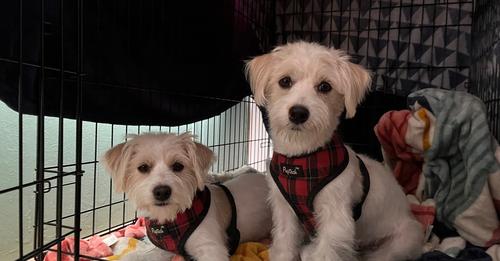It’s no secret that puppies are one of the most adorable little critters on the planet, but do you have what it takes to take care of them? It’s National Puppy Day, so it might be tempting to go out and adopt one right away, but here are some of the things you can expect when you’re expecting a puppy.
Pups are the cutest, but they do some not so cute things. Like poop in the living room, pee on the couch and barf on the rug. Not to mention they just love chewing on everything in site, from a new pair of crocs to the leg of your favorite chair.
“Everybody thinks it’s a cute idea to get a little puppy, but then they forget they’re little goblins running around your house,” said Caroline Mattioli, a professional dog trainer and owner of Got It Dog Training, told USA TODAY.
Mattioli, who started out as a Dolphin Trainer in Florida, said that people need to realize that dog training is only a tiny part of getting a new puppy.
“Part of my job with the dogs is I’m a human trainer too,” she said. “I really train the people to train the dog.”
Getting a puppy is a lot of responsibility that people need to make sure they can handle before they do, said Mattioli.
How much sleep do dogs need?Here’s when owners should worry, from a veterinarian.
National Puppy Day: What should I do before getting a puppy?
Research! Make sure this si something you want to do. Mattioli said a lot of people like the idea of having a dog, but don’t realize the kind of energy it will take to raise one.
“Can you commit to that, and can you commit to 10 to 15 years of caring for something?” asked Mattioli.
If you think you can handle all the barking and waking up to your favorite pair of shoes being torn up, now you need to look at expenses.
National Puppy Day: How much does it cost?
Well, according to data sent to USA TODAY from Rover, Pet parenthood can range from $1,000 to $5,225, but optional extras will cost most dog parents $1,405 to $6,235 per year.
“We can all agree that the unconditional love between you and your dog is priceless,” said Kate Jaffe, a trends expert at Rover. “But it’s also important to be aware of the financial responsibility associated with being a pet parent. Local shelters can be a great way to find a loving companion and they’re usually lower cost.
The cost will include the following, according to Rover:
Spay or neuter surgery: $250-$525
Microchip + ID tags: $20-$95
Initial vet exam and vaccinations: $165-$515
Collar: $5-$60
Harness: $5-$80
Leash: $10-$75
Food and water bowls: $5-$80
Poop bags + holder: $10-$90
Crate: $25-$475
Bed: $10-$470
Grooming items: Brush and nail trimmer $15-$125
Cleaning supplies such as stain and odor removers and wipes: $5-$55
Potty pads: $5-$70
Toys and chews: $5-$220
Treats: $2-$125
Basic veterinary care: $275-$435
Pet license: $20-$125
Food (wet and dry): $45-$345
National Puppy Day: What breed should I adopt?
It depends. Mattioli says first-time dog owners should stay far away from Chihuahuas and herding dogs, like German Shepherds.
She cautions against getting any dog that are hard to handle.
“People get a type of dog that they really did not understand because they didn’t do the research and then that dog probably ends up in a shelter or worse, put down,” said the dog trainer.
For first-time owners, she recommends looking into adopting Cavalier King Charles Spaniels.
“They’re pretty easygoing [and] very people-oriented,” said Mattioli. “I don’t want to generalize or stereotype, but the majority of the time, they seem to be really well fitted for like families or first-time dog owners [because] of their temperament.”
For those looking to adopt from a shelter, Mattioli recommends looking at their temperament and making sure they get along with those already in your household.
National Puppy Day: What goes into training?
While class trainings, like ones provided by Petco or Petsmart, are an option for learning the basics, Mattioli says all dog owners should look into personal trainers as well. But what works best for each dog depends on the dog itself.
If after the third or fourth group class a dog is still scared, Mattioli recommends folks look into private lessons instead.
But event if a dog thrives in group classes, they can stil benefit from personal trainers.
“I still think people should do private lessons regardless of the type of dog that they have, because there’s always always stuff to learn,” said Mattioli. “There’s a lot of stuff to learn in a private lesson that you can’t learn in a group class just because the group class is one trainer for eight dogs.”










